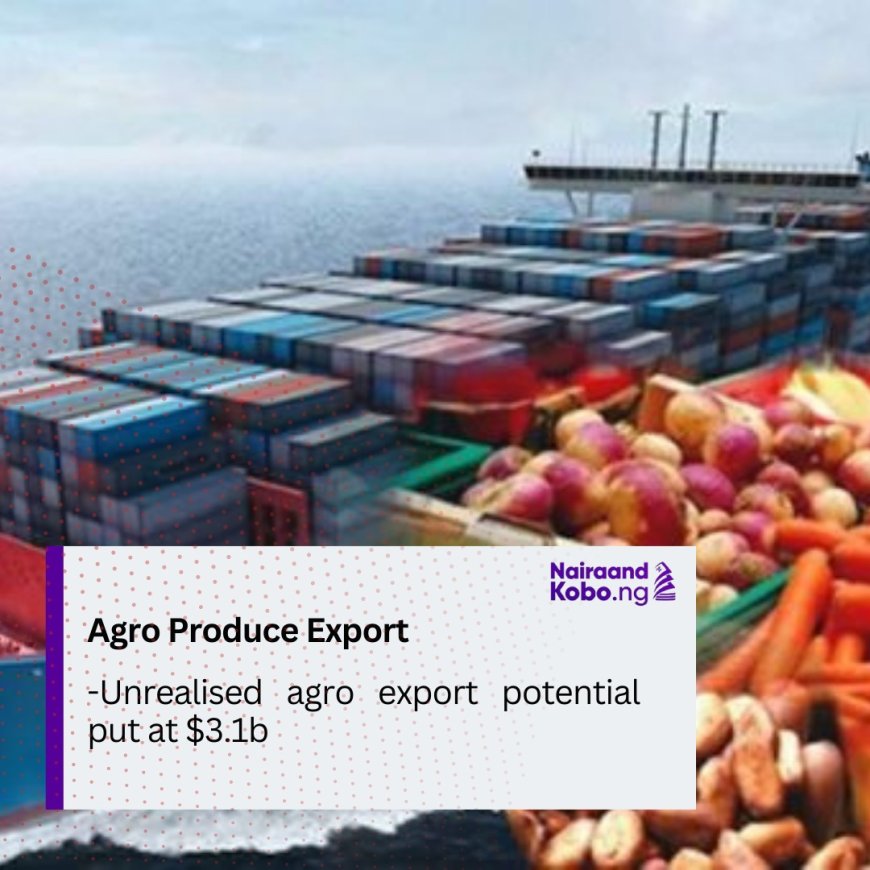Unrealised agro export potential put at $3.1b

Nigeria has significant unrealised potential in agro commodities exports, estimated at around $3.1 billion. This is according to data provided by the international trade centre (ITC)’s Export Potential Map.
This is even as Nigeria’s agricultural sector recorded strong growth in the first quarter (Q1) of this year with exports rising to N1.04 trillion—a 123 per cent increase from the previous quarter and a staggering 270 per cent rise compared to Q1 of last year, according to the National Bureau of Statistics (NBS).
The potential stems from the country’s rich agricultural resources and diverse climate, which allow for the cultivation of various cash crops such as cocoa, cashew, palm oil, and more.
Export Potential Map provides timely and practical information on products, markets, and suppliers with untapped export potential.
For instance, Nigeria ‘s export potential for cocoa beans is $1.1 billion, while actual exports is $697million ,according to data released by ITC. According to it, the markets with greatest potential for Nigeria’s exports of cocoa beans are Netherlands, Germany and Indonesia.
Netherlands export potential for Nigeria’s cocoa beans is estimated at $210 million ,while actual exports is $243 million.
In total, Netherlands imports of cocoa beans globally is valued at $1.9 billion annually. Approximately, Netherland’s total trade in goods with Nigeria is $3.7 billion.
Also, cocoa beans export potential to Germany is $173 million while actual exports are $117 million. Unrealised potential is $56 million.
Annually, Germany’s global cocoa beans imports is estimated at $1.2 billion while its total trade in goods with Nigeria is $1.8 billion.
Furthermore, export potential to Indonesia is $149 million while actual exports $73 million. Unrealised potential is $76 million.Annually, Indonesia‘s global Cocoa beans imports is estimated at $570 million while its total trade in goods with Nigeria is $2.6 billion.
Speaking on this , Chief of Staff, OCP Africa, Caleb Usoh attributed the existing export potential situation to the fact that agriculture has been held back by an incomplete logistics system which fails to ensure quality and connect farms with markets.
His words: “We have the potential to do more in every front of agriculture. From production to preserving to outbound logistics- There are a lot of inefficiencies which we have to address. Some of these inefficiencies are largely based on infrastructure which is not available in some instances.”
According to him, poor transportation and storage facilities hinder the efficient movement and preservation of agricultural products.
The provision of infrastructure which is the responsibility of the government is what enables trade. We are talking about international trade now. How do we enable movement of materials from the hinterland where they are produced to the seaport? It is something we need to look at. The rail system is not functional. That would have been a better way of moving bulk materials in a preserved form.”
Though the Federal Government is driving agricultural products export to the international markets, he indicated that exporters were not able to compete with products from other countries in terms of quality and price due to drawbacks of the existing logistics system.
He blamed poor storage and delivery systems as the main causes of unrealised export potential business indexes of Nigeria‘s agricultural products .
“The roads are very bad. Materials stay on the roads for upward of 10 days. Imagine if you are moving from the North to Lagos and you are on the road for 10days. Some of these produce have short shelf lives. Exporters lose a lot as a result of poor logistics.”
To boost export growth, he stressed that the government must review the processes at the seaports. This,according to him, will help ensure they do not further erode the nation’s competitive edge and put its robust growth path at risk.
He urged the government to work with the private sector to make logistics more efficient, optimise connectivity, business environment, and competitiveness.According to him, improving the nation’s export earnings requires a system-wide logistics optimisation based on greater coordination among all public institutions with the private sector.This,he noted ,would increase the effective capacity of logistics infrastructure, and remove distortions capable of raising costs and impeding quality.
Unrealised agro export potential put at $3.1b - The Nation Newspaper (thenationonlineng.net)









